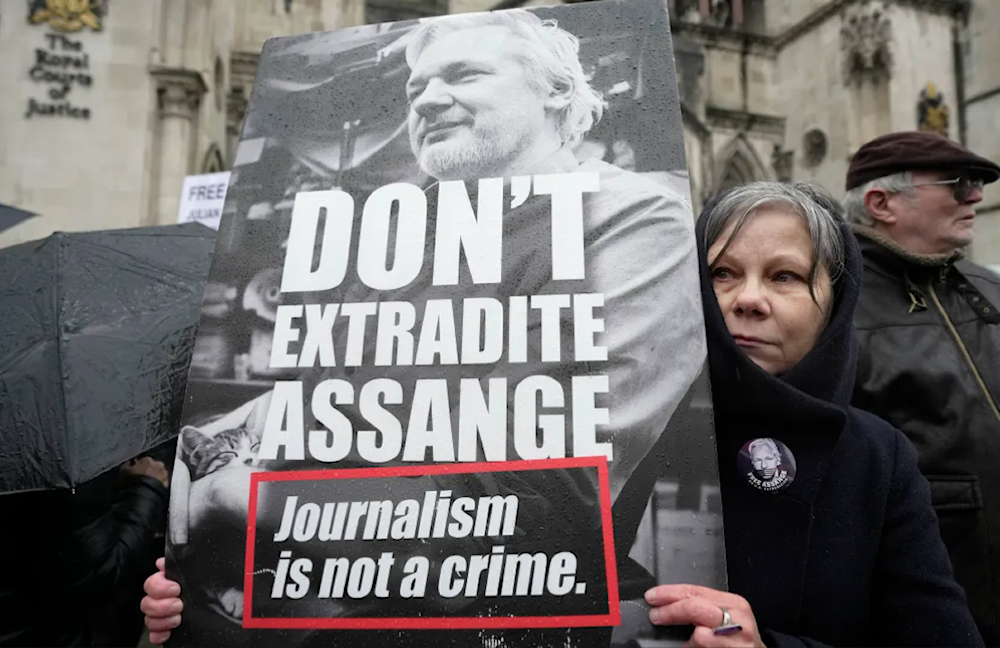Assange final ruling by London High Court due Tuesday
If Assange wins, a full appeal hearing will be convened to reconsider his case.
-

A protester holds a placard outside the Royal Courts of Justice in London, Wednesday, Feb. 21, 2024. (AP)
London's High Court will rule on whether WikiLeaks founder Julian Assange may appeal against extradition from Britain to the United States on Tuesday, in what could be the final chapter in his legal troubles in Britain.
Assange is facing a lengthy court struggle with the British government to prevent extradition to the United States to face trial for publishing thousands of sensitive US military data and diplomatic cables in 2010.
He was charged by US prosecutors in 2019 and has been captured in London since.
On Tuesday, at 10:30 am (GMT), two senior judges will rule. If he wins, a full appeal hearing will be convened to reconsider his case. If his battle is lost, his only alternative will be to appeal to the European Court of Human Rights.
This is it.
— Stella Assange #FreeAssangeNOW (@Stella_Assange) March 25, 2024
DECISION TOMORROW.
10.30am
Royal Courts of Justice#FreeAssangeNOWhttps://t.co/QzQEvejJNu pic.twitter.com/pt6nIeiaIt
During the February hearings, Assange's team claimed that the prosecution was politically motivated and that he was being pursued for exposing "state-level crimes," in addition to revelations that former US President Donald Trump had sought "detailed options" on how to assassinate Assange.
His lawyers have maintained that he only published material provided to him as any journalist would and therefore is not guilty.
Chelsea Manning, a former US Army intelligence analyst who was convicted of leaking government secrets to WikiLeaks, spent seven years in jail. According to legal experts, any term for Assange would most likely be shorter than Manning served.
Last month, UK justices in the High Court heard Assange's assertions that he risked punishment for his political ideas and that extradition would violate his right to free expression—an issue they are poised to decide on shortly.
US Justice Department mulling deal for Assange entailing guilty plea
According to sources familiar with the situation last week, the US Justice Department is considering allowing WikiLeaks founder Julian Assange to plead guilty to a reduced charge of mishandling classified information, potentially ending his 14-year legal troubles.
Sources told The Wall Street Journal that Justice Department officials and Assange's attorneys have had early conversations in recent months about what a plea deal may look like.
Barry Pollack, one of Assange's lawyers, divulged that he has yet to receive any indication the government will accept a bargain, if any.
Under such a deal, Assange might submit that plea remotely, without having to go to the US. The time he has spent behind bars in London would count toward any US sentence, and he would most likely be released soon after any agreement was reached.
Assange extradition breaches US-UK extradition treaty, Snowden says
Edward Snowden, former US National Security Agency contractor and whistleblower, said last month that the potential extradition of WikiLeaks founder Julian Assange to the United States by UK authorities would constitute a breach of the US-UK extradition treaty.
"The outrageous part of the UK's years-long 'trial' to condemn Julian Assange to die in an American dungeon is that the victim of his 'crime' (journalism) is a state rather than a person — the definition of a political offense, which the US-UK extradition treaty explicitly forbids," Snowden wrote on X.
He further called on political leaders and journalists not to remain silent on Assange's trial as they could still "actually influence the outcome."
To every political leader and journalist making and writing speeches: You can't save Navalny. You *can* still save Assange. If you're silent here, when and where you can actually influence the outcome, you were never standing up for principles—you were just hoping for applause. https://t.co/RRPSoAgiGe
— Edward Snowden (@Snowden) February 20, 2024

 3 Min Read
3 Min Read








